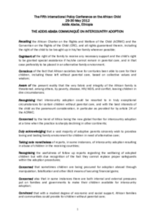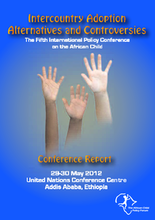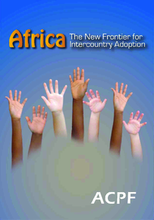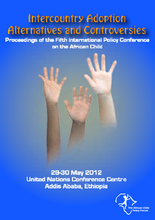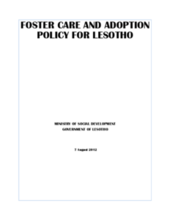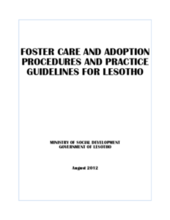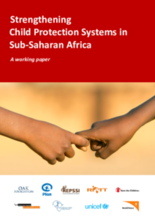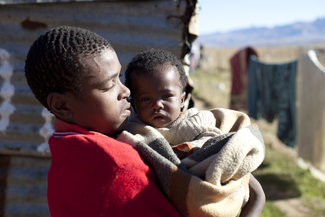

Displaying 421 - 430 of 576
In the recently released outcome document of the Fifth International Policy Conference on the African Child, conference delegates call for a reversal of the current trend of resorting to intercountry adoption as a primary solution for African children in need of alternative care, and for giving prime priority to enabling all children in Africa to remain with their families and communities.
This document provides an overview of The Fifth International Policy Conference on the African Child held on 29-30 May 2012 at the United Nations Conference Center Addis Ababa, Ethiopia. The overall goal of the Fifth IPC was to further the discussion on intercountry adoption and to contribute to the improvement of national laws, policies, systems and procedures relating to intercountry adoption.
This publication was prepared as a background document to inform the discussions and debates during the Fifth International Policy Conference on the African Child held on 29-30 May 2012 in Addis Ababa, Ethiopia. This report provides a situational analysis of the law and practice of intercountry adoption in Africa, with the aim of informing debate on conceptualizing, developing and implementing policies, laws, and programs and research in relation to intercountry adoption in Africa.
The Proceedings report presents summaries of all presentations delivered and of all plenary discussions held during each session of the Fifth International Policy Conference on the African Child (IPC) held on 29 and 30 May 2012 in Addis Ababa, Ethiopia, which brought together experts, policymakers, and key stakeholders to discuss various issues and the implications of intercountry adoption in Africa.
In light of these challenges, during the summer of 2011, the International Organization for Adolescents (IOFA) conducted a needs assessment in Addis Ababa, Ethiopia that focused on identifying the strengths, needs, and risks of orphaned and vulnerable adolescents who are transitioning to independence. The data collected has served to inform the overall Transitions Initiative, led by IOFA, which aims to establish a comprehensive support system for youth aging out of care and to build awareness around the issues that this vulnerable population confronts
This paper focuses on appropriate responses to the unique challenges faced by young people at risk who are transitioning out of state care in South Africa.
A document containing the policy for foster care and adoption in Lesotho.
This document contains the Procedures and Practice Guidelines for Foster Care and Adoption in Lesotho.
This paper is a response to the increasing need for agreement on approaches and documented evidence of good practices consistent with system strengthening work. The purpose of the Inter-Agency Working Paper is to consolidate current thinking, examples and lessons learned about child protection system strengthening in sub-Saharan Africa and suggest a way forward.
This discussion paper puts forward a set of lessons learned and recommendations for referral mechanisms and case management for vulnerable children in the Eastern and Southern Africa region (ESAR).

